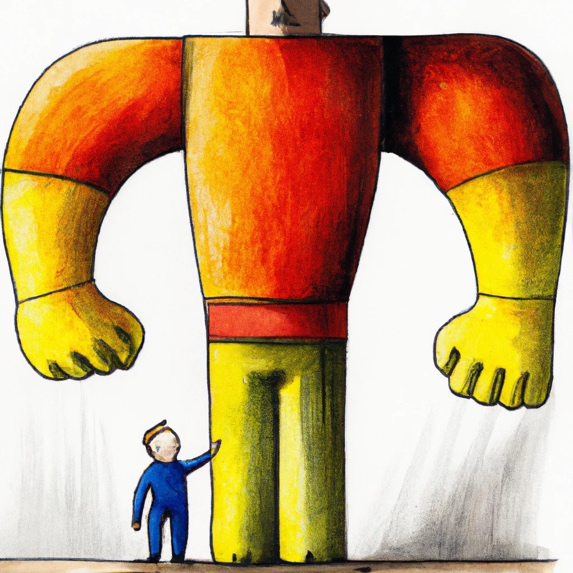David and Goliath
If you are a startup, big companies can be scary. They have power and could invade your turf at any moment. They could copy your product leveraging their many more resources and distribution advantage. For example, this is what happened with Instagram Stories with Snapchat or Twitter Spaces with Clubhouse.
Big companies have money and power. But what is often said to contrast this is that startups are fast and nimble. They can outmaneuver the giant corporation and win out of sheer speed and focus. The startup myth is that they are to big companies like David is to Goliath. Is that really the case?

Big companies have multiple advantages. The first one is money. They have a longer runway than any startup. Not needing to raise to stay alive, they can funnel the revenue from another product to fuel the growth of a new one. They can operate at cost or at a loss to acquire users and market share. They can use their existing relationships and distribution channels to sell the new product. Or they can bundle the new product with another more popular and already existing (see Microsoft Teams and Slack). The other big advantage is that they have access to talent. They can afford to pay high salaries, concrete immediate upsides compared to the stock option programs of startups. They can attract people with perks: free lunches, modern equipment, and discretionary budgets.
But being big is not only positive. I like to compare big companies as big animals. Like elephants or whales. Big organisms have multiple downsides given their size.
There are some problems that go with size:
- The bigger an organism the slower their reaction speed. Think about the nervous system being centralized. The bigger the company the slower information flows to the brain. This is the case for most big companies. Who has not experienced slow decision-making in a big corporation? Slow information not only impacts the reaction speed, but also the coordination. It’s a vicious cycle.
- Big companies have a lot to lose. They are already profitable. That’s how they got where they are. Changing something could result in them messing up and killing their golden goose. Therefore, they are very careful (slow) about changing things.
- The bigger you are the more visible you are. It’s difficult to miss a giraffe in a savanna. External threats can come from increased visibility. You don’t have the luxury of developing something in complete silence for long. Everybody has their eyes on you and information is hard to keep secret. Other companies can see where you are headed.
- Big companies have also more money and more prestigious role that go with them. While this is also a positive, we need to be aware of the flip side. Money and prestige result in status games and politics. Where individuals think more about themselves and what they can gain than the good of the system. This is also true on an organizational level, not only for individuals. Similar things can happen in big companies when different department have misaligned incentives and prioritize short-term selfish projects compared to aiming for a better whole.
- Big companies also have many employees. And you know what they say about a kitchen with too many cooks. Everybody ends up stepping on everybody’s toes. Fighting for the same surface (product) area. Think about a random app that you have on your smartphone e.g., Google Maps. From the user’s perspective the screens and interactions stay pretty much the same for years. By adding more people to work on the product you cannot equally scale the number of changes in the interaction. You want to maintain consistency and familiarity at the behest of teams being not as productive as they should. Note: This point has probably the biggest caveat being that product at scale need a lot of ‘hidden’ work in area such as infrastructure, safety, and compliance. I still believe that a scale you end up reaching a point for which teams are not any more efficient. A sort of Dunbar number for product organization.
This is a fantastic opportunity for startups. By realizing the conundrum big companies are in they can outmaneuver them. Focusing on the weaknesses of big companies they can build a strategy to succeed.
Daring more, shipping more, surprising the market. Startups can be smart and aim for the right objective. A bit like David, taking a step back and understand its enemy’s weaknesses, throwing the stone directly in the eye of the cyclops.